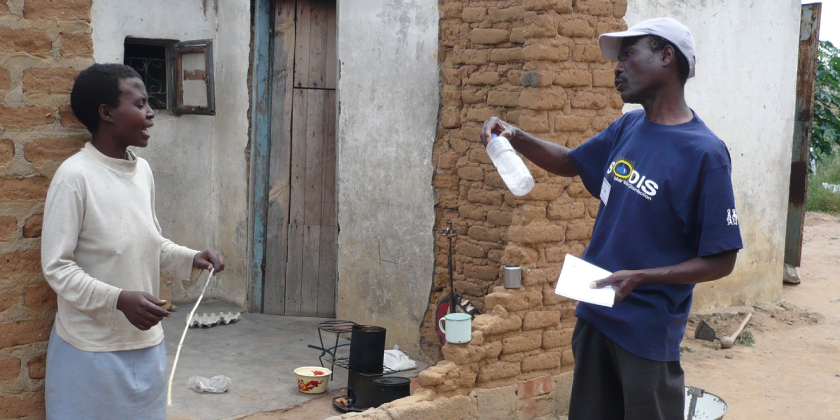Department Environmental Social Sciences
Achieving long-term use of solar water disinfection in Zimbabwe

Project description
Household water treatment can guarantee safe drinking water to prevent diarrhea and cholera. However, high compliance and sustainable use is seldom achieved. The present study designed and evaluated several promotion strategies for solar water disinfection (SODIS), based on results from a baseline survey. Visits to inform households about the costs and benefits of SODIS combined with public commitment and memory aids were emerged as the best strategy, resulting in 80-90% of households using SODIS even 14 months after intervention.
Context
The consumption of unsafe water is one of the main causes of diarrhea, which leads to the deaths of an estimated of 760,000 children under the age of five worldwide each year. Households in the peri-urban areas of Harare, Zimbabwe drink unsafe water from wells, surface water, or intermittent piped water supply. Episodes of cholera are frequent in these areas. Household water treatment systems, such as solar water disinfection (SODIS), could prevent a large proportion of diarrhea cases. However they are neither frequently nor consistently used.
Objectives
The main objective of this study was to find out which behavior change strategy would be most effective in securing high compliance and sustained use of SODIS. For that purpose, first, SODIS was introduced in communities in peri-urban areas of Harare. Then, different behavior change strategies were developed and evaluated with regard to the population’s sustainable uptake of SODIS.
Activities
Step 1 + 2: Identify, measure, and determine behavioral factors of SODIS use.
- A baseline survey was conducted.
- A doer/non-doer analysis revealed the following behavioral factors to explain SODIS use: Knowledge about the safety of raw water (health knowledge), beliefs about the expensiveness, taste, and how time-consuming or difficult to perform SODIS is, belief about what others think about SODIS (others’ approval), and whether performing SODIS is intended in the future (intention) and perceived as a habit.
Step 3: Select behavior change techniques (BCTs) and design behavior change strategies to enhance SODIS use. The following behavior change strategies were designed:
- Visits using the BCT inform households about and assess costs and benefits were followed by public commitment and the use of memory aids such as a reminder notice.
- The BCT prompt talk to others was used for a pass-on task for which community members were trained to convince other persons to use SODIS, who in turn should convince more persons, generating a ‘snowball effect’.
- The pass-on-task in combination with the BCT highlight the discrepancy between set goal and actual behavior contrasted desirable behaviors with actual practices.
Step 4: Implement and evaluate behavior change strategies for SODIS use
- The behavior change strategies were evaluated through a before-after control trial.
- The strategies were implemented in four different areas. A fifth area served as control group.
- Behavioral factors and SODIS use were surveyed several times. The last survey was conducted 14 months after the latest intervention.
- The effectiveness of the promotion activities was measured by observing whether the households had SODIS bottles exposed to the sun.
Findings
The most effective strategy was the visit to inform households about and assess costs and benefits in combination with public commitment and the use of memory aids such as a reminder notice.
In the areas receiving these strategies, 80-90% of the households were still using SODIS 14 months after the intervention had ended.
Conclusion
This project revealed that systematic behavior change strategies make it possible to achieve highly frequent and sustainable use of household water treatment and thus the safe water consumption levels necessary for improved health.
